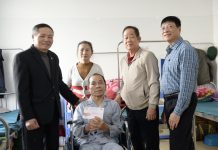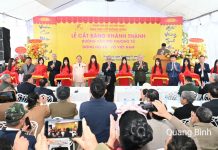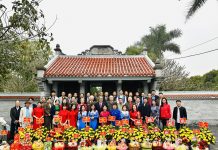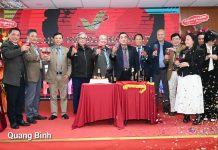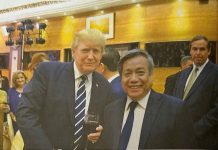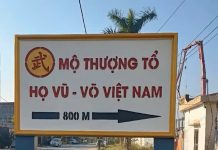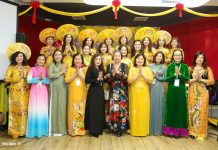General Vo Nguyen Giap was a distinguished commander who led victories against the most powerful invading armies in the world and is recognized as one of the greatest generals of all time.
Numerous works, both domestic and international, have praised the military prowess, strategic genius, and noble character of General Vo Nguyen Giap. This article will focus on the core values of kindness and intelligence embedded within the Vu – Vo clan, which are clearly reflected in General Giap’s persona—an embodiment of national pride and global admiration. Having had the privilege of meeting and working with General Giap, I aim to recall some personal memories that further highlight his distinguished character as a military leader, full of intellect and compassion.

General Vo Nguyen Giap. Photo: Archive
The surnames Vu and Vo represent two phonetic variations of the name of a clan originating from Mo Trach village in Binh Giang district (formerly Duong An district), a region historically known for its deep appreciation of education. Over time, the Vu – Vo clan has spread across the country, but its defining characteristic remains its long-standing tradition of academic excellence and high achievement. During the reign of Emperor Le Thanh Tong, one of the most enlightened rulers of Vietnam’s golden age, who greatly valued the contributions of talented individuals, Vu Huu emerged as the first Vietnamese mathematician. His work on “Lap thanh toan phap” assisted the royal court in fiscal calculations, land measurements, and large-scale construction projects in the Imperial Citadel of Thang Long. Another distinguished scholar from the Vu family, Vu Quynh, contributed significantly to literature and history, compiling and annotating the legends of the Hung Kings era, which later formed the basis for historians to include this period in the official national historical records.
The Vu – Vo clan has not only produced brilliant scholars but also distinguished military figures. Throughout Vietnam’s long history, each era has seen the emergence of notable generals from this clan. In this brief article, I will highlight three remarkable military leaders whose exceptional talents clearly exemplify the qualities of their Vu – Vo lineage.
First, I would like to mention Vu Nap, a prominent figure from Mo Trach village, who was renowned for his literary skills. During the Mongol invasion in 1258, Vu Nap was assigned the task of defending the Hai Dong region. Over the course of nearly 30 years of governing this area, he made significant contributions to organizing the population, reclaiming land, and establishing settlements, transforming a once underdeveloped coastal area into a thriving community. However, it was his military achievements, particularly his involvement in the Battle of Bach Dang River in 1288 alongside General Tran Quoc Bao, that earned him a lasting place in both local and national history. To lead the Mongol army into a trap, it was essential to prevent them from following the river route through Gia River. The difficult task was entrusted by Tran Quoc Tuan to Generals Tran Quoc Bao and Vu Nap. As the Mongol forces advanced, General Tran Quoc Bao was killed in battle, and Vu Nap assumed command. Despite the disparity in forces, Vu Nap demonstrated remarkable wisdom and strategic acumen, combining military tactics with local knowledge. He enlisted the support of local people, who gathered thousands of palm leaves to place in the river and hide along both banks. This created the illusion of a large ambush, forcing the Mongols to hesitate and ultimately retreat. Vu Nap’s ingenuity forced the Mongol fleet to take a different route. In the end, the army led by Vu Nap completed the mission assigned by the National Duke, forcing more than 600 enemy warships to return to the Da Bac river and then being herded into the stake field to be ambushed and completely defeated.
The second military figure worth mentioning is Grand Admiral Vo Van Dung, a legendary general from the Tay Son uprising. Vo Van Dung, as well as Tran Quang Dieu, was a close and trusted ally of Nguyen Hue, playing an indispensable role in the major military campaigns of the Tay Son movement. He was highly regarded by Emperor Quang Trung, who referred to Vo Van Dung as his most trusted confidant. Promoted to Grand Admiral and later to High Minister of War, Vo Van Dung was not only a skilled military commander but also a shrewd diplomat. After the Tay Son forces decisively defeated the Qing army in 1789, Emperor Quang Trung, aware of the potential for Qing retaliation, sent a diplomatic mission led by Vo Van Dung to ease tensions with the Qing court. Vo Van Dung’s diplomatic acumen successfully persuaded the Qing to abandon their plans for further hostilities. This encounter revealed to Quang Trung the Qing’s fear of the Tay Son army, prompting the emperor to send Vo Van Dung on a second diplomatic mission with more assertive demands. However, Emperor Quang Trung passed away before these beneficial demands could be fully realized.
The third figure of the Vo family to be mentioned is Vo Duy Duong (commonly known in history as Thien Ho Duong). He was originally from Binh Dinh and later moved to reclaim land in Dong Thap Muoi, where he was appointed by the royal court as a Thien Ho (a military title). Despite being a military officer, he had a deep passion for literature and formed a close friendship with Valedictorian Huan (Nguyen Huu Huan). When the Nguyen Dynasty signed the Treaty 1862, he, along with Nguyen Huu Huan and Truong Dinh, organized resistance against the French. Understanding the unfavorable situation in terms of forces and the cowardice of the Nguyen court, he applied his intellect to devise a strategy to regain control over the three eastern provinces. Unfortunately, he passed away en route to Hue, the imperial capital, before the plan could be implemented.
Many other military commanders of the Vo family have contributed to the national struggle against foreign invaders. To varying degrees, they share similarities with the three figures mentioned above. Before engaging in military affairs, they were individuals who excelled in academics, were fond of literature, and had a deep love for the arts. Upon becoming military leaders, they often relied on intellect and strategic thinking to devise plans for defeating the enemy, rather than solely focusing on military tactics and warfare.
General Vo Nguyen Giap embodied the comprehensive tradition of both military and scholarly prowess of the Vu-Vo family. Born and raised in a land rich in historical tradition, General Vo Nguyen Giap was nurtured in a family with a noble lifestyle, where both parents were known for their compassion and patriotism, instilling strict discipline in their children. His father, Vo Quang Nghiem, was a poor village teacher who also worked as a local healer in An Xa village, Loc Thuy commune, Le Thuy district, Quang Binh province. He frequently spoke of the anti-French movement through the poem “That thu kinh do” (The Fall of the Capital), leaving a profound impact on the young General. His mother, Nguyen Thi Kien, came from a family with a long tradition of patriotism and resistance against foreign invaders. His maternal grandfather was a leader in the Can Vuong movement, heading a province during the late 19th century. As a child, General Giap was told stories of the Regent Ton That Thuyet and his efforts to rally scholars and the people to rise up against the French. It was these close and profound influences that contributed to forging the General’s strong will for his later revolutionary career.

General Vo Nguyen Giap. Photo: VNA
A historic meeting with leader Nguyen Ai Quoc in 1940 defined the course of his life. From an early stage, President Ho Chi Minh recognized General Giap’s qualities—his intellect, talent, and character—as ideal for leading an army dedicated to gaining and maintaining revolutionary power. This army, according to Ho Chi Minh, must rely on the people for its strength, and it must defeat the enemy not only with weapons and military strategy but with intellect and culture as well. The leader of such an army must be both scholarly and martial, knowledgeable, and compassionate. In 1944, General Giap was formally entrusted with the task of establishing the revolutionary armed forces known as the The Vietnam Propaganda Unit of Liberation Army. From that moment, as the head of the army, General Giap became a military commander who was undefeated in battle. Alongside his military genius, it was easy to recognize him as a general of intellect and compassion, qualities refined from the noble traditions of his people, homeland, and lineage.

The working delegation of the National-level Scientific Conference to celebrate the 110th birthday anniversary of General Vo Nguyen Giap offering incense at the General’s tomb.
Though a military general, General Giap chose the pseudonym “Van,” which clearly reflected the intellectual and humanistic essence of his character. He was the first to advocate for historians to approach the study of Vietnam’s anti-foreign resistance history from a cultural perspective, rather than solely from a military viewpoint. In 1998, I had the privilege of assisting Professor Phan Huy Le organize the first International Conference on Vietnamese Studies. It was an honor for the conference to have General Giap accept our invitation to attend and present a speech during the plenary session. This also gave me the opportunity to visit 30 Hoang Dieu to hear General Giap’s guiding opinions. On one such occasion, I learned a significant philosophy from him: “Vietnamese military art is a domain within the realm of culture.” Initially, I did not fully understand, but General Giap patiently explained: “Culture encompasses all human creativity for the survival and development of the community. In Vietnam’s history, nation-building has always gone hand in hand with defending the nation; from one generation to the next, we have been forced to rise up, armed, using all our talent and intellect to protect our independence. All military innovations are for the preservation of the nation, of the country; if it is not culture, then what is it?” I have shared this with many people, and they all share the same sentiment: General Giap was not only a renowned general but also a great thinker and a cultural figure.
During the preparation for the conference, General Vo Nguyen Giap also explained to us certain matters that, according to him, both domestic and international Vietnamese studies had yet to provide satisfactory answers for in the history of Vietnam. He even mentioned that “there are many events and periods that cannot yet be explained.”
First, he pointed out the phenomenon of the Vietnamese people losing their independence, subsequently being placed under the rule of militarily powerful, wealthy, and highly civilized feudal dynasties for thousands of years without being assimilated. This, according to General Giap, is a unique event in human history that requires further research to be fully understood.
Second, he discussed the remarkable strength of the Vietnamese people during the resistance wars against foreign invaders. Almost all of the invading armies throughout history were incredibly powerful and aggressive, including some that were considered capable of shaking the world. In the 13th century, the Mongol army, which conquered most of Asia and Europe, created the largest contiguous empire in human history, was defeated three times by the Vietnamese people. General Giap said that this phenomenon could not be simply explained. Only a profound understanding of history could clarify why we were able to defeat the mighty American empire, which, before its defeat in the Vietnam War, caused any nation, even the most powerful ones, to fear and avoid confrontation.
The General’s instructions rendered me feel as though I were being instructed by an experienced historian, and I was filled with an inexplicable sense of pride. In addition to his innate talent, everything General Giap had achieved was the result of a long process of accumulating knowledge both in school and through real-world experience. He had been a student at the University of Indochina, the predecessor of Hanoi National University, which is a cradle for nurturing and educating talents. The pride was further heightened by the fact that General Giap loved history and chose it as his profession. He often said that if there had been no war, he would have been a history teacher. Perhaps that is why he accepted the position of Honorary Chairman of the Vietnam Association of Historical Sciences, which was considered a great honor for the historical community nationwide. His intellectual and humanistic qualities likely stemmed, in part, from here.
One incident that left a deep impression on me was when I directly heard General Giap explain why he decided to adopt the strategy “strike firmly, advance firmly” instead of “strike quickly, win quickly.” The world knows General Giap for his historic victory at Dien Bien Phu, which shook the globe. I had already memorized many details of this monumental historical event, but I was particularly impressed with his thought process behind the “strike firmly, advance firmly” strategy. Until then, I had thought of it simply as a wise decision, a genius military strategy. However, it turned out that what caused General Giap many sleepless nights in making this decision was not just the two words “sure win” but because of his deep concern for the lives of his soldiers. Rarely has there been a military leader with such a compassionate heart for his soldiers, as the saying goes, “One general’s work is worth ten thousand bones,” a philosophy that is accepted as the rule of war. Perhaps it was this compassionate heart of General Giap that led him to think deeply about culture after the war ended.
In 1972, when the US used B-52 bombers to bomb Hai Phong and Hanoi, I was stationed in Quang Binh, and there is one event that I will never forget. One day, while gathering news from Western stations, I received a piece of information that shocked me, leaving my body almost paralyzed. I could not believe my ears. Then, not just one, but several foreign stations broadcasted the same bad news: General Vo Nguyen Giap had died from a B-52 bomb during a trip to inspect missile positions… None of us believed this (or rather, we did not want to believe it), but for some reason, we all burst into tears, crying uncontrollably as if we had lost our closest relative. Surely, the Central Government knew about this, so the very next day, Voice of Vietnam and the Vietnam News Agency continuously broadcasted news that General Giap had gone to inspect the units… The joy that came to us was beyond words, even turning into an optimistic spirit, as if we were about to liberate the South. This shows just how important General Giap was in the hearts of the soldiers.

Prof. DSc. (People’s Teacher) Vu Minh Giang at the national scientific conference: “General, Commander-in-Chief Vo Nguyen Giap – An outstanding military talent, charismatic leader great credit of the Vietnamese revolution” on the 110th anniversary of General Giap’s birth.
Exactly ten years later (1982) in Moscow, I had the honor of meeting General Giap, who was then serving as Vice Chairman of the Council of Ministers in charge of Science and Technology. At that time, I had been sent to pursue my doctoral studies at Lomonosov University. For some reason, after a meeting with representatives of research students and senior trainees, General Giap asked me to stay behind for a private conversation. That precious meeting was one of the most significant events of my life, where I had the opportunity to meet General Giap and Professor Dang Bich Ha, his wife. What I remember most from that meeting was when I told them about how my unit had cried heavily upon hearing the news of General Giap being hit by a bomb, and I thought General Giap would laugh it off as a humorous story. Instead, he showed deep emotion and said, our comrades were very good, which truly astonished me. General Giap was genuinely moved by the sincere affection his soldiers had for him.
It is impossible to fully express the greatness of our legendary General in words. General Vo Nguyen Giap is universally recognized as a military genius. This talent was nurtured by the cultural and resilient traditions of our nation, the homeland of Quang Binh, the family, and, especially, the profound influence of his parents. His genius was also shaped by early exposure to patriotic scholars and, most importantly, by the guidance and mentorship of President Ho Chi Minh. It is rare to find all over the world a military leader who, after achieving victory in countless battles against much stronger enemies, also possesses such a compassionate, humble heart as General Vo Nguyen Giap.
In Vietnamese history, there have been national heroes who have been deified, such as the Trung Sisters, Ly Thuong Kiet, Tran Hung Dao, Tran Nhan Tong, Le Loi, Nguyen Trai, and Quang Trung… Deep in my heart, I believe that General Vo Nguyen Giap will live forever and become a divine figure in the hearts of the people.
Prof. DSc. Vu Minh Giang (People’s Teacher)






